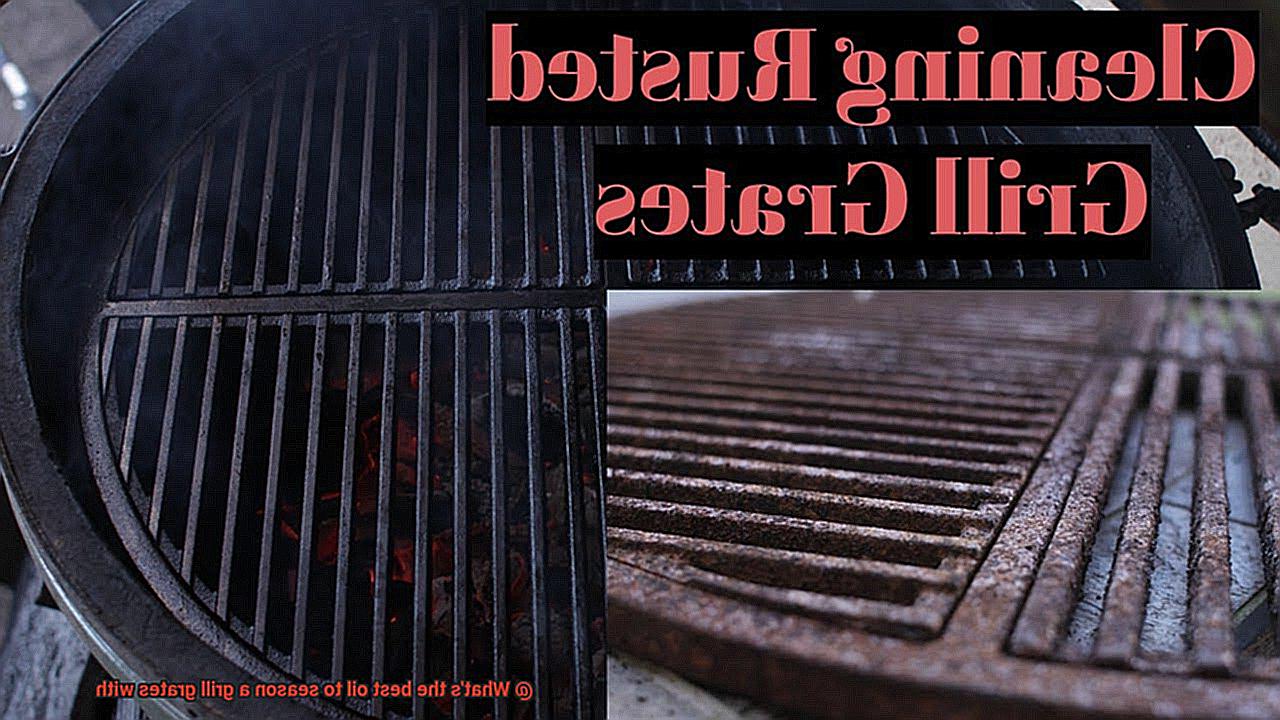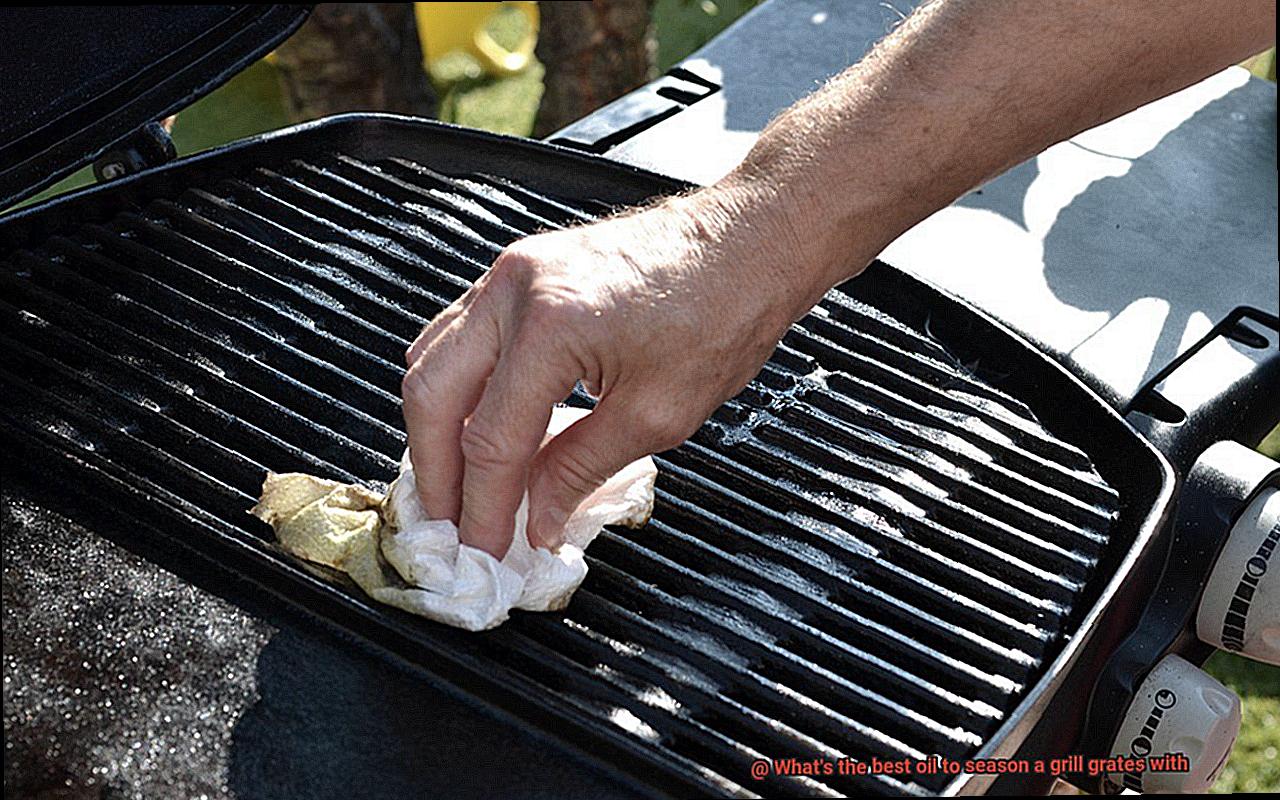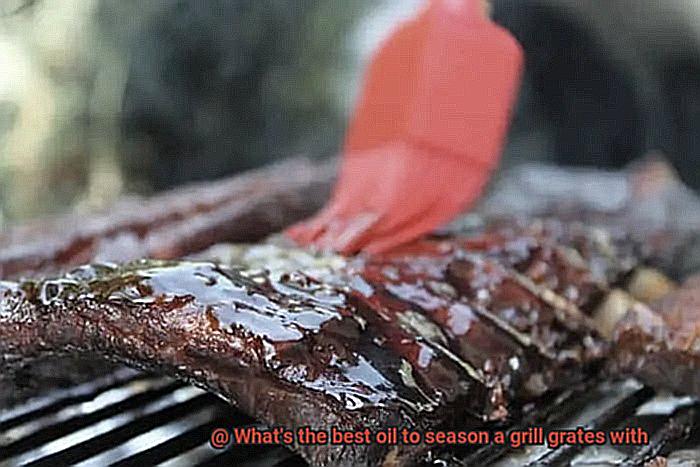Are you a grill master who takes pride in your summer cookouts? If so, you know that the key to great grilling is maintaining your equipment. One essential step to keep your grill grates in top condition is seasoning them with oil. But, the million-dollar question remains – what’s the best oil for this task?
Don’t be fooled into thinking any old oil will do. In fact, using the wrong oil can damage your grill grates and ruin the taste of your food. So, it’s vital to choose wisely and pick an oil that will ensure your grill grates remain in excellent shape while enhancing the flavor of your food.
In this blog post, we’ll dive deep into the world of oils and explore which ones are best for seasoning grill grates. We’ll cover everything from classic vegetable and canola oils to more exotic options like sesame or peanut oil. So whether you’re a traditionalist or an adventurer, we’ve got you covered.
Stay tuned to discover which oil reigns supreme when it comes to seasoning grill grates and taking your grilling game to new heights.
Contents
What is Grill Grate Seasoning?
Grilling is an art that requires the right tools to create the perfect masterpiece. One of the most important tools in grilling is the grill grate. A well-seasoned grill grate can make all the difference in how your food turns out. But what exactly is grill grate seasoning, and why is it so important?
Grill grate seasoning is a process of treating your grill grates with oil to create a non-stick surface and ensure even heat distribution. This process involves coating the grates with oil and heating them for a period of time, allowing the oil to penetrate the metal and create a protective layer.
Choosing the right oil for your seasoning process is crucial. You want an oil with a high smoke point, which means that it can withstand high temperatures without breaking down and producing harmful fumes. Canola oil, peanut oil, grapeseed oil, and avocado oil are all great options due to their high smoke points and neutral flavors.
When you season your grill grates, you not only prevent food from sticking but also enhance the flavor of your food. The oil creates a barrier between the food and the metal grates, which enhances the flavor of your meat or vegetables. Plus, it creates those beautiful grill marks that we all love.
But seasoning your grill grates isn’t just about improving the taste of your food. It’s also essential for maintaining the quality and lifespan of your grill grates. Without proper seasoning, your grates can rust and deteriorate over time, which can affect the taste and safety of your food.

To properly season your grill grates, start by cleaning them thoroughly with a wire brush or scraper. Then, coat them with a high smoke point oil using a brush or paper towel. Place them on a heated grill for about 15-20 minutes, or until they start to smoke. Let them cool before wiping off any excess oil.
What Makes a Good Oil for Grill Grate Seasoning?

As a grill master, you know that seasoning your grill grates is essential for creating mouth-watering barbeque dishes. But did you know that choosing the right oil for this process is just as important? When it comes to seasoning grill grates, there are a few factors to consider when selecting the perfect oil.
Firstly, it’s crucial to choose an oil with a high smoke point. The smoke point refers to the temperature at which the oil starts to burn and release smoke. Using an oil with a low smoke point can result in burnt-tasting food and can damage your grill grates. So, selecting an oil that can withstand high heat is key.
Another vital factor is the oil’s fat content. Oils with high fat content help to create a protective layer on the grill grates, preventing food from sticking and making it easier to clean. This means that you’ll have less time scrubbing away at your grates and more time enjoying your delicious meal.
Lastly, you want to choose a flavorless oil that won’t add any undesirable taste to your food. Choosing an oil that doesn’t have a distinct flavor ensures that your food will taste exactly how you want it to.
So, what oils are best for seasoning grill grates? Here are some options:
- Vegetable oils like canola or grapeseed oil have high smoke points and are relatively inexpensive.
- Flaxseed oil forms a hard, durable coating over time and is perfect for cast iron grates.
- Avocado oil has a high smoke point and contains healthy fats.
It’s important to note that not all oils are created equal when it comes to seasoning grill grates. Avoid using oils with low smoke points like olive oil, butter, or coconut oil as they can burn easily and create a sticky residue on your grill grates.
Canola Oil
Attention all grill masters. Are you searching for the perfect oil to elevate your grilling game? Look no further than canola oil. As an expert on this topic, I am here to share with you the amazing benefits of using canola oil to season your grill grates.
Firstly, canola oil boasts a high smoke point, making it an ideal choice for high-heat grilling. With a smoke point of around 400-450°F, canola oil is one of the most heat-resistant cooking oils, ensuring that it won’t burn or spoil your food with a rancid taste.
Moreover, canola oil has a neutral flavor that won’t overpower the natural taste of your grilled delicacies. This feature is especially crucial when grilling delicate items like seafood or vegetables, where you want the flavors to shine through. So not only will your food taste great, but it will also be healthier since canola oil has an excellent balance of omega-3 and omega-6 fatty acids that are essential for maintaining good health.
To use canola oil to season your grill grates, start by thoroughly cleaning them with a grill brush or scraper. Then, apply a thin layer of canola oil evenly to all surfaces using a clean cloth or paper towel. Heat the grill to a high temperature and let the oil bake onto the grates for about 15 minutes before using.
While canola oil is undoubtedly a fantastic option for seasoning your grill grates, it’s worth noting that other oils such as grapeseed and vegetable oil also have high smoke points and neutral flavors. Ultimately, the best oil for your grill grates will depend on your personal preference and what you are grilling.
Peanut Oil
Look no further than peanut oil. As a grilling expert, I can confidently say that peanut oil is the perfect choice for seasoning your grill grates.
Firstly, consider the high smoke point of peanut oil. It has the ability to handle high heat without burning or smoking, making it an ideal oil for searing and grilling. With peanut oil, you can rest assured that your grill grates won’t get too hot and ruin your tasty meal.
Moreover, peanut oil has a neutral flavor that won’t overpower the natural taste of your food. While grilling meats and vegetables, you want the flavors of your ingredients to shine through, and peanut oil won’t interfere with that.
When using peanut oil to season your grill grates, it’s essential to select a high-quality, additive and preservative-free oil. Choose cold-pressed or expeller-pressed oils as they are made without chemicals or solvents.
To season your grill grates with peanut oil, start by thoroughly cleaning and drying them. Then, use a clean cloth or brush to apply a thin layer of peanut oil to both sides of the grates evenly.

Next, preheat your grill to a high temperature and let the grates cook for about 20 minutes. This process will help “cure” the oil and create a non-stick surface on the grates.
Grapeseed Oil
Look no further than grapeseed oil. This oil is extracted from the seeds of grapes, making it a byproduct of wine production. Not only does it have a neutral flavor and light texture, but it also has a high smoke point, making it the perfect option for seasoning grill grates without overpowering the taste of your food.
But that’s not all – grapeseed oil is also packed with health benefits. It contains vitamin E, which acts as an antioxidant and helps prevent harmful compounds from forming on your grill grates during cooking. Plus, it’s low in saturated fat and high in polyunsaturated fats, making it a healthier option than some other oils.
To season your grill grates with grapeseed oil, start by cleaning them thoroughly with a wire brush. Then, apply a thin layer of grapeseed oil to both sides of the grates using a paper towel or brush. Preheat your grill to a high temperature and allow it to cook for 15-20 minutes. Once done, let the grates cool down before wiping off any excess oil with another paper towel.
In summary, here are the top reasons why grapeseed oil should be your go-to option for seasoning grill grates:
- High smoke point
- Neutral flavor
- Rich in vitamin E antioxidants
- Low in saturated fat and high in polyunsaturated fats
Avocado Oil
Look no further than avocado oil. As an expert on the topic, I can attest that avocado oil is an excellent choice for grilling enthusiasts everywhere.
One of the reasons avocado oil is so popular among grillers is its high smoke point – around 520°F. This means the oil can withstand the high temperatures of grilling without breaking down and producing harmful compounds. You can enjoy your favorite foods without any concerns about negative health effects from the oil.
But that’s not all – avocado oil is also packed with health benefits. For starters, it’s high in monounsaturated fats, which have been linked to improved heart health and weight management. Additionally, it contains antioxidants such as vitamin E, which can help protect against inflammation and oxidative damage.
When it comes to using avocado oil to season your grill grates, there are a few tips to keep in mind. First, apply a thin layer of the oil using a paper towel or brush. Second, heat the grates before applying the oil and allow it to fully coat the surface before placing any food on the grill. This will ensure that your food cooks evenly and won’t stick to the grates.
Animal Fats
Calling all grill masters. Are you searching for an oil to season your grill grates with that will take your grilled meats to the next level? Look no further than animal fats. Bacon grease, lard, and beef tallow are popular choices for seasoning grill grates. These animal fats offer unique flavors and provide a non-stick surface, making grilling a breeze.
Let’s take a closer look at each animal fat option. Bacon grease is a delicious choice that adds a smoky taste to grilled meats. It has a smoke point of approximately 375°F, which makes it perfect for high-heat grilling. However, it is important to note that bacon grease is high in saturated fat and should be used in moderation.
If you’re looking for a healthier option, lard may be the answer. This animal fat has a smoke point of around 370°F and is versatile enough to use for both high-heat grilling and low-heat cooking. Lard is also lower in saturated fat than bacon grease, making it a great alternative.
For those who want to take their grilling game up another notch, beef tallow is the way to go. With a smoke point of approximately 400°F and its rich flavor, beef tallow provides a unique taste experience for grilled meats. However, sourcing beef tallow may be more challenging as it may not be readily available at grocery stores.
While animal fats can provide excellent flavor and ease of grilling, it is important to use them in moderation as they are high in saturated fat. Consider your personal dietary needs and preferences when selecting an oil for seasoning grill grates.
ogumeVM5M4k” >
Conclusion
In conclusion, the secret to achieving perfectly grilled meats and vegetables lies in seasoning your grill grates with the right oil. But not just any oil will do. To create a non-stick surface on your grill grates while enhancing the natural flavors of your food, you need an oil with a high smoke point, low saturated fat content, and a neutral flavor.
So what are the best options? Canola oil, peanut oil, grapeseed oil, and avocado oil are all great choices due to their high smoke points and neutral flavors. But beware of oils with low smoke points like olive oil, butter, or coconut oil which can burn easily and leave behind sticky residue on your grill grates.
For those looking for unique flavors and non-stick properties, animal fats like bacon grease, lard, and beef tallow are popular choices. However, they should be used in moderation as they are high in saturated fat.
Remember that properly seasoning your grill grates not only enhances the taste of your food but also maintains the quality and lifespan of your grill grates. So choose wisely.






